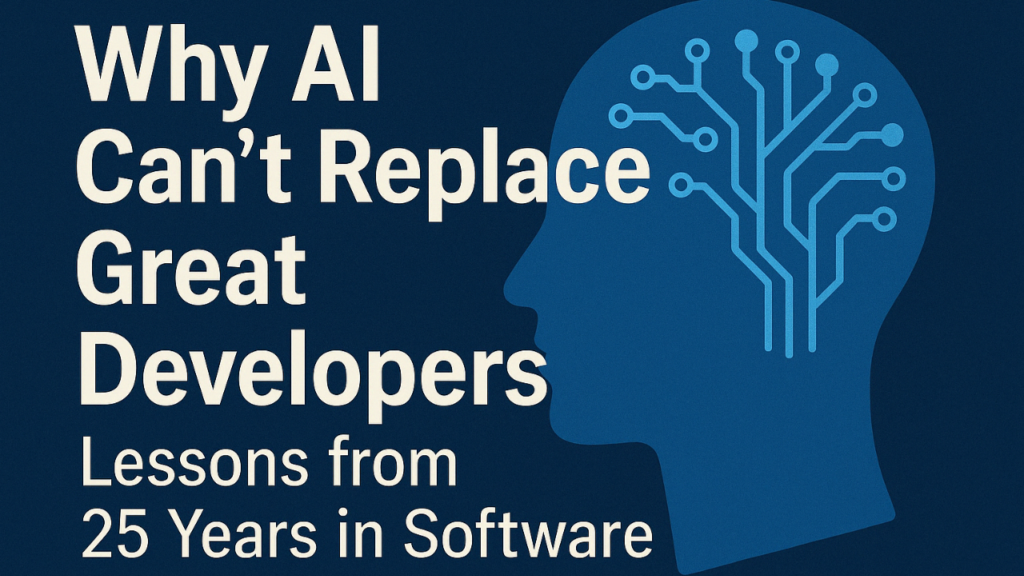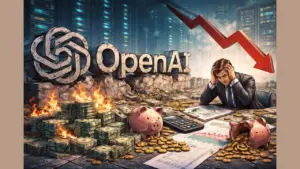Introduction: Let’s Get Real About AI and Code
AI tools have taken the coding world by storm. They write functions, suggest bug fixes, and even generate entire modules. I use them myself. They’re powerful and fast. But here’s the truth: writing code is not the same as building software that solves real problems.
The hype around AI replacing developers is just that—hype. Underneath the glossy tweets and bold headlines lies a more complicated reality. Most executives are still unsatisfied with their AI implementations. Why? Because there’s a world of difference between pattern-matching and problem-solving.
Software development is not just technical. It involves creativity, empathy, and collaboration. And these are areas where AI still struggles. We need to talk about the gaps AI can’t fill.
What Big Tech Isn’t Telling You
Big tech CEOs love to talk about AI. It boosts their stock prices and pleases investors. But they often leave out one major fact: 94% of C-suite executives admit they are not happy with their current AI solutions.
Even more revealing? 72% of these leaders struggle to integrate AI effectively into their operations. Yet, they keep selling the dream that AI will do it all.
The gap between what AI promises and what it delivers is widening. Companies want quick fixes. They think AI is the answer. But real software development is about humans, not just code.
There’s also a growing trust gap. While AI can generate impressive outputs, it often does so without transparency. Developers can’t always explain why an AI-generated solution works. That creates risk, especially in mission-critical systems.
The Gap Between Code and Context
Let me share a story. I once spent three days tracking a tricky bug. It wasn’t in the code itself. It was a business logic issue. Once I understood the client’s goals, the solution became obvious.
AI wouldn’t have caught it. Why? Because it doesn’t understand the business context. It doesn’t know why a feature matters or how it supports a user’s journey.
AI works by recognizing patterns. It can generate code that looks correct. But it can’t reason through human needs. That makes it prone to subtle but dangerous mistakes.
I’ve seen AI recommend perfectly syntactical code that breaks an entire workflow because it lacked awareness of user behavior. Without understanding the “why” behind a feature, AI misses the big picture.
Software isn’t just about syntax. It’s about solving real problems for real people. And that requires a deep understanding of both the problem and the people behind it.
Building Software Is More Than Just Code
During my first startup, I learned a key lesson: knowing what to build is more important than knowing how to build it.
AI can assist in writing code. But it has no clue what users actually need. It doesn’t care about the product-market fit. It doesn’t question assumptions. It doesn’t ask why.
Developers do more than type. They explore. They ask questions. They align technical choices with business goals. That’s a human skill—one AI hasn’t mastered.
I’ve spent hours interviewing users, collecting feedback, and brainstorming ideas with cross-functional teams. Those conversations shape the product. Not just how it looks, but how it feels, functions, and evolves over time.
Good software starts with a problem. Great developers dig deep to understand that problem. They work with teams, ask tough questions, and make trade-offs. AI just doesn’t do that.
Even prototyping requires creativity. We often build multiple versions of a feature, test them with users, and make adjustments. AI can’t participate in that discovery process.
Why Human Skills Still Matter Most
The most valuable developers I know are not the fastest coders. They’re the best listeners. They translate fuzzy ideas into structured systems.
That takes empathy. It takes patience. It takes understanding the user’s world.
AI doesn’t have emotions. It doesn’t sit in meetings. It doesn’t sense when a client is unsure or stressed. But I do.
I’ve been in countless meetings where reading the room was more important than reading the spec sheet. Sometimes, clients don’t know exactly what they want. A good developer helps them figure it out.
People change. So do their needs. Requirements evolve. AI tools struggle to keep up unless constantly supervised.
Team dynamics also play a role. Developers often act as translators between product managers, designers, and executives. They manage expectations and communicate trade-offs. These soft skills are vital and deeply human.
AI also can’t provide mentorship. Junior developers rely on senior engineers to guide them. That mentorship helps teams grow, bond, and build better software.
AI’s Limits in Product Innovation
AI excels at making existing code better. It can refactor, optimize, and suggest improvements. But it’s not great at invention.
Creating something new requires imagination. It means taking risks. It means dreaming up features that users didn’t even know they wanted.
Some of the best products I’ve worked on came from messy whiteboard sessions. We argued. We explored dead ends. We changed direction.
Those moments are where innovation lives. Not in a dataset. Not in a prediction. But in human creativity and collaboration.
Innovation also requires leadership. Someone needs to make hard choices, prioritize goals, and accept uncertainty. AI doesn’t handle ambiguity well. It needs clean input to generate output.
True innovation is about intuition and experience. It’s about seeing beyond the immediate ask and anticipating future needs. Only people can do that.
Conclusion: Code Is Easy, People Are Hard
After 25 years in software development, I know this: the hardest part isn’t the code. It’s understanding people. It’s translating complex needs into simple solutions.
AI is a useful tool. But it’s not a replacement for thoughtful, empathetic developers. The real value in tech comes from human insight, not machine output.
As developers, our job isn’t just to build things right. It’s to build the right things.
So the next time someone says AI is taking over, remind them that tools don’t create products. People do.
At StartupHakk, we believe in empowering developers, not replacing them. Because the future of software isn’t just smarter code—it’s smarter collaboration. We celebrate the unique value that human developers bring to the table. Because in the end, great software is built not just by logic, but by love, empathy, and vision.




